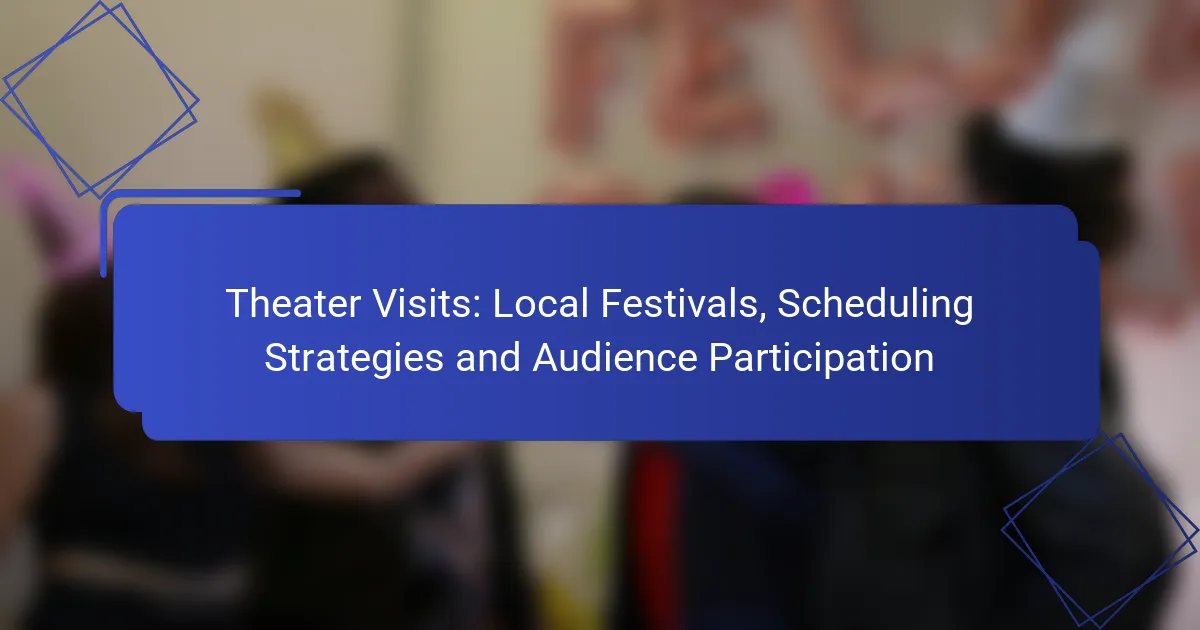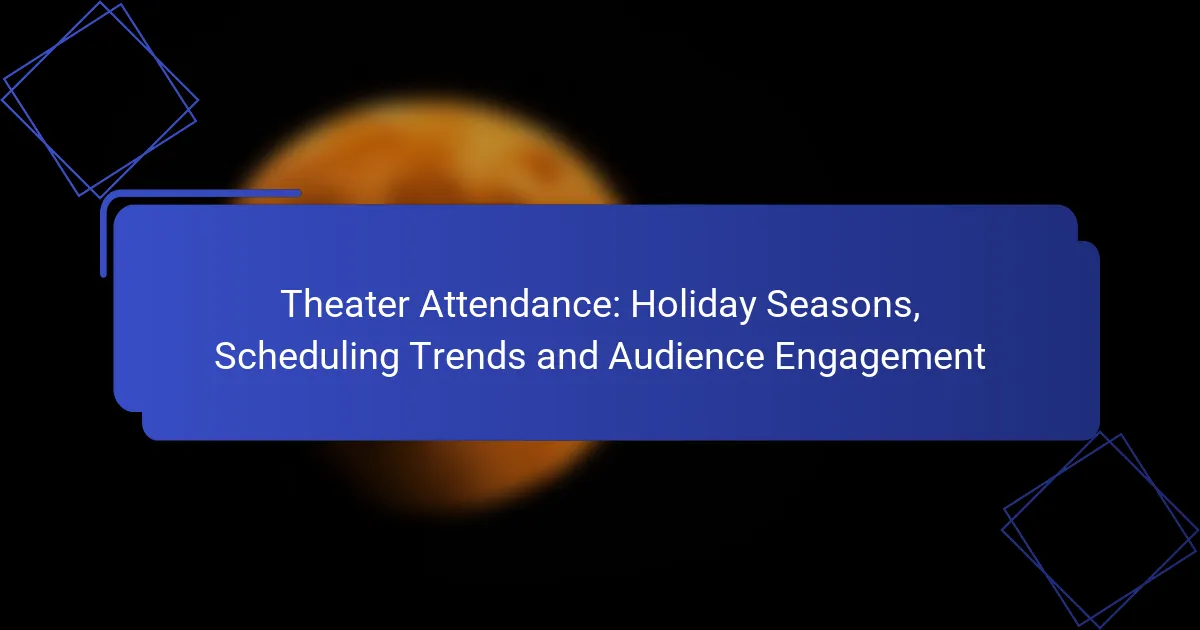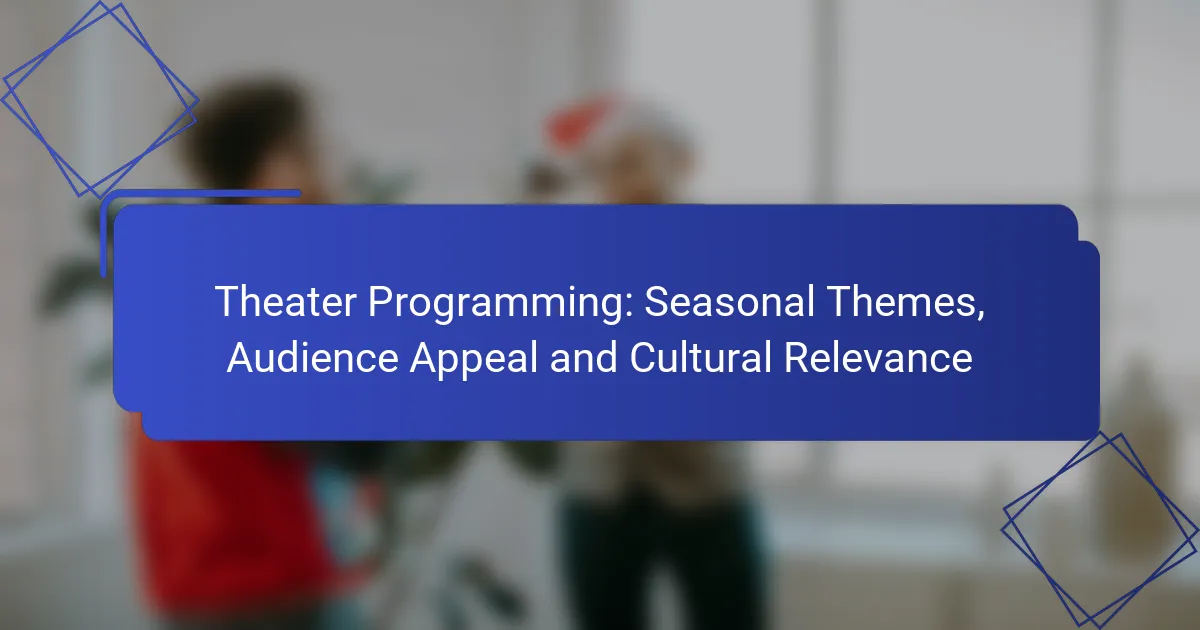Local theater festivals in the US present a vibrant array of performances that engage diverse audiences and highlight both established and emerging talent. To make the most of your theater visits, it’s essential to prioritize shows that resonate with your interests while considering scheduling factors like timing and ticket availability. Engaging with these festivals not only enriches your cultural experience but also strengthens community connections through shared artistic expressions.

What are the best local theater festivals in the US?
The best local theater festivals in the US showcase a variety of performances and attract diverse audiences. These festivals often feature both established and emerging artists, providing a platform for innovative works and classic plays alike.
Shakespeare in the Park
Shakespeare in the Park is a beloved annual event held in various cities, most notably in New York City’s Central Park. This festival offers free performances of Shakespeare’s plays, making classic theater accessible to everyone.
Typically running from late spring to early fall, attendees can enjoy a picnic while watching the performances. Arriving early is advisable, as seating is first-come, first-served, and popular shows can draw large crowds.
Newport Folk Festival
While primarily a music festival, the Newport Folk Festival also features theatrical performances that celebrate storytelling through song and drama. This festival takes place in Newport, Rhode Island, and is known for its vibrant atmosphere and community engagement.
Held annually in late July, the festival attracts a mix of established artists and newcomers. Visitors can expect a blend of music and theatrical storytelling, making it a unique experience for those who appreciate both forms of art.
Oregon Shakespeare Festival
The Oregon Shakespeare Festival, located in Ashland, is one of the largest and oldest theater festivals in the US, running from February to October. It features a diverse lineup of Shakespearean plays alongside contemporary works, appealing to a wide audience.
With multiple stages and a variety of performances each day, attendees can easily fill their schedules with shows. Purchasing tickets in advance is recommended, as popular performances often sell out quickly. The festival also offers educational programs and workshops, enhancing the overall experience for theater enthusiasts.

How can I schedule my theater visits effectively?
To schedule your theater visits effectively, prioritize shows that interest you and utilize tools that streamline the booking process. Consider factors such as timing, ticket availability, and audience demand to enhance your experience.
Use online ticketing platforms
Online ticketing platforms simplify the process of booking theater tickets. Websites and apps like Ticketmaster, Eventbrite, or local platforms allow you to compare prices, check availability, and secure your seats in just a few clicks.
When using these platforms, look for features such as mobile tickets, which can save time at the venue, and alerts for discounted prices or special offers. Always read reviews to ensure the platform is reputable and secure.
Plan around peak times
Planning your theater visits around peak times can significantly affect your experience. Weekends and holidays typically see higher attendance, which may lead to sold-out shows or higher ticket prices. If possible, consider attending performances on weekdays or during matinee times for a more relaxed atmosphere.
Additionally, check for off-peak discounts or special promotions that theaters may offer during less busy times. This not only saves money but also enhances your overall enjoyment by avoiding crowded conditions.

What are the benefits of attending local theater festivals?
Attending local theater festivals offers numerous advantages, including fostering community ties and enhancing cultural appreciation. These events provide a platform for diverse performances, allowing audiences to experience unique narratives and artistic expressions.
Community engagement
Local theater festivals serve as a hub for community engagement, bringing together residents from various backgrounds. They create opportunities for social interaction, collaboration, and shared experiences, which can strengthen neighborhood bonds.
Participating in these festivals can also encourage volunteerism, as many events rely on local volunteers for organization and support. This involvement can lead to a deeper connection to the arts and a sense of pride in local culture.
Support for local artists
Local theater festivals are crucial for supporting emerging artists by providing them with a platform to showcase their work. These events often feature a range of performances, from established plays to experimental works, allowing artists to gain exposure and feedback.
By attending these festivals, audiences contribute to the local economy and help sustain the arts community. Purchasing tickets, merchandise, or food at these events directly supports the artists and organizations involved, fostering a vibrant cultural scene.

How can audience participation enhance theater experiences?
Audience participation can significantly enrich theater experiences by fostering a deeper connection between performers and viewers. Engaging the audience creates a dynamic atmosphere, encouraging emotional investment and making performances more memorable.
Interactive performances
Interactive performances invite audience members to engage directly with the actors and the storyline, often breaking the fourth wall. This can include asking for audience input on decisions that affect the plot or allowing spectators to join in on stage. Such experiences can vary widely, from small-scale productions in local theaters to larger festivals that encourage participation.
For example, a theater in New York might host a musical where attendees can sing along or dance, while a community theater in a small town may offer a play where audience members can suggest lines or actions. These interactions can lead to spontaneous moments that enhance enjoyment and create unique memories.
Workshops and discussions
Workshops and discussions provide opportunities for audiences to engage with the themes and techniques of a production beyond the performance itself. These sessions can include acting workshops, behind-the-scenes tours, or post-show discussions with the cast and crew, allowing for a deeper understanding of the artistic process.
For instance, a theater festival in London might offer a series of workshops led by experienced actors, where participants can learn about character development and improvisation. Engaging in these activities not only enhances appreciation for the art form but also fosters a sense of community among participants.

What are the key factors to consider when choosing a theater festival?
When selecting a theater festival, consider factors such as location accessibility and the festival’s reputation. These elements can significantly impact your overall experience and enjoyment of the event.
Location accessibility
Location accessibility refers to how easy it is to reach the festival venue. Consider factors like public transportation options, parking availability, and the distance from your accommodation. Festivals in urban areas often have better access, while rural festivals may require more planning.
Check if the venue is wheelchair accessible and if there are facilities for those with disabilities. This can enhance the experience for all attendees, ensuring everyone can enjoy the performances.
Festival reputation
The reputation of a theater festival can influence the quality of performances and the overall atmosphere. Look for festivals that have received positive reviews from previous attendees or industry professionals. Established festivals often attract renowned artists and productions, enhancing your experience.
Research online platforms, social media, and local theater communities to gather insights about the festival’s history and credibility. A well-regarded festival may offer a more enriching experience compared to lesser-known events.

What scheduling strategies can maximize my theater experience?
To maximize your theater experience, focus on prioritizing must-see shows and utilizing festival schedules. These strategies help ensure you attend the most impactful performances while managing your time effectively.
Prioritize must-see shows
Identifying must-see shows is crucial for an enriching theater experience. Start by researching upcoming performances and selecting those that resonate with your interests, whether they are critically acclaimed productions or popular crowd favorites.
Consider factors like reviews, cast, and director when prioritizing. For instance, a show featuring a renowned actor or a unique storyline may warrant a higher priority. Aim to book tickets well in advance, especially for high-demand performances, to secure your spot.
Utilize festival schedules
Theater festivals often showcase a variety of performances in a condensed timeframe, making them an excellent opportunity to experience multiple shows. Familiarize yourself with the festival schedule, noting key dates and times for each performance.
When attending a festival, plan your itinerary to include a mix of genres and styles. This approach not only enriches your experience but also allows you to discover new talents and productions you might not have considered otherwise. Be mindful of ticket availability, as popular shows may sell out quickly.

How does audience feedback influence theater productions?
Audience feedback plays a crucial role in shaping theater productions by providing insights into viewer preferences and experiences. This feedback can guide directors and producers in making adjustments to performances, ensuring they resonate more effectively with their audiences.
Impact on future performances
Feedback from audiences can directly influence future performances by highlighting what elements were successful and which fell flat. For instance, if a particular scene receives praise, it may be expanded or emphasized in subsequent shows. Conversely, scenes that are met with indifference might be revised or removed altogether.
Theaters often collect feedback through surveys, social media interactions, or post-show discussions. This data can help identify trends in audience preferences, allowing productions to adapt and evolve over time.
Role in community programming
Audience feedback is essential for community programming, as it helps theaters understand the cultural and social needs of their local populations. Engaging with community members can lead to productions that reflect local stories, issues, and interests, fostering a deeper connection between the theater and its audience.
Theaters may host community forums or workshops to gather input, ensuring that their programming aligns with the desires of the community. This participatory approach not only enhances audience satisfaction but also encourages greater attendance and support for local theater initiatives.



